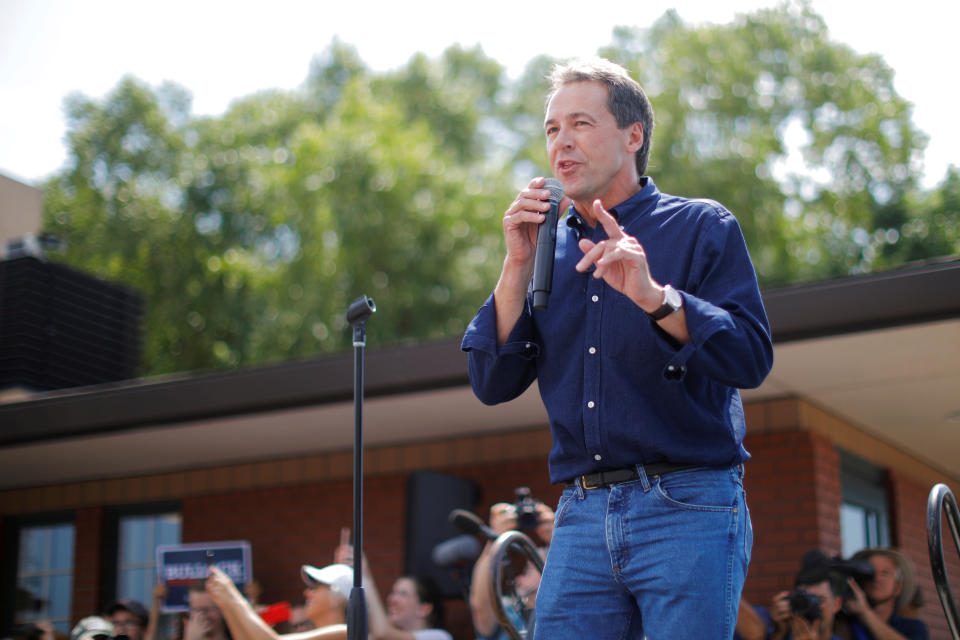Excluded from the debates, Bullock plots an increasingly unlikely path to the White House
NEW YORK — On Tuesday, the bulk of the Democrats running for president were prepping for the first debate after the start of the impeachment inquiry. Sen. Elizabeth Warren took a walk around Columbus. Entrepreneur Andrew Yang threw a ball around with staff on Otterbein University’s lawn. But Steve Bullock, the only governor of the group, was hundreds of miles away from the spin room. He watched his rivals duke it out onstage at home with his family.
“I'm not sure that these debates are really always connecting with people's everyday challenges and lives,” the Montana governor told Yahoo News during a brief sit-down interview on Thursday morning. “In some respects, maybe I got in late to play the DNC debate game rules, but I don’t think it will be the debates that will decide who our nominee is.”
Bullock, a Democratic governor from a Republican state, did not hit the DNC’s threshold for the Ohio event — not a new phenomenon for the candidate. He announced his bid in May and was unable to qualify for the first, jam-packed Democratic debate in June or the third round in Houston.
Instead of fighting for airtime at a podium, he hosted town halls in Iowa and New Hampshire during the Miami debates. When the other candidates gathered in Houston for the third debate, he campaigned with former Iowa first lady Christie Vilsack.
Bullock’s calculus is a lot more traditional, one that forgoes viral headlines and breakout moments in favor of face time in consequential states like Iowa, New Hampshire, South Carolina and Nevada. It’s a well-worn strategy, and one that many of his top-tier rivals are doing with ratcheted-up staffing numbers.

Yet it’s also one that has not yielded huge national polling numbers for Bullock: 0.2 percent, according to RealClearPolitics. A poll of Iowa Democratic caucus voters released by Emerson University on Thursday places him at 4 percent support, just under Yang and a degree ahead of New Jersey Sen. Cory Booker, which may indicate some payoff.
“I think voters are just now starting to pay attention,” he added. But how is he going to capture the attention of voters who don’t live in those four states? By embracing the power of cable news, which is somewhat out of his comfort zone.
“In 10 years in public life in some respects ... I almost always avoided cable television. Because in some ways, it’s set up for conflict. It is not set up for actually making sure that you can get things done.”
Yet he says that he’s up to making the rounds.
“I'll be on CNN later today, MSNBC tomorrow; I'll continue to do those efforts to both connect with people and raise that visibility.”
While Bullock wouldn’t speak specifically to where his campaign pack-up point would be, he did concede that he saw little path forward for candidates who don’t break out in Iowa. Viability, he concedes, depends on what happens in the early states.
“If somebody doesn't punch the ticket in the top four in Iowa,” he says, “I don't think they go forward.”
Read more from Yahoo News:
Greta Thunberg: Powerful men 'want to silence' young climate activists
Driven from Central America by gangs and finding refuge in Kentucky: One woman's story
'I talk about power because you're not supposed to': Why Stacey Abrams still wants to be president
Nation's intelligence officers are resigned to serving a president who doesn't trust them
Before Black Lives Matter: Exhibition pays tribute to an earlier NYPD killing of unarmed black man
360: U.S. pulls support for Syrian Kurds: What happens next?
PHOTOS: Turkey presses Syrian assault as thousands flee the fighting



